Fleurs du Mal Magazine


Or see the index
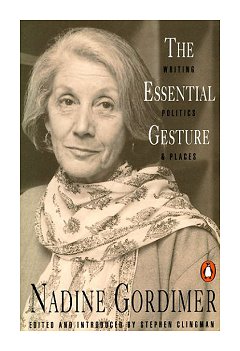 In Memoriam South African author
In Memoriam South African author
Nadine Gordimer
Nadine Gordimer (20 Nov.1923 -13 July 2014) the South African Nobel Prize-winning author, has died in Johannesburg aged 90.
The writer was one of the literary world’s most strong voices against apartheid. She was a leading member of the African National Congress (ANC) and fought for the release of Nelson Mandela.
In 1974 Gordimer won the Booker Prize and she was awarded the Nobel Prize for Literature in 1991.
Bibliography Nadine Gordimer
2007 Beethoven Was One-Sixteenth Black, Bloomsbury
2005 Get A Life, Bloomsbury
2004 Telling Tales, editor, Bloomsbury
2003 Loot, Bloomsbury
2001 The Pickup, Bloomsbury
1999 Living in Hope and History: Notes On Our Century, Bloomsbury
1998 The House Gun, Bloomsbury
1996 Harald, Claudia and Their Son Duncan, Bloomsbury Birthday Quid, Bloomsbury
1994 Writing and Being, Harvard University Press
1994 None to Accompany Me, Bloomsbury
1992 Why Haven’t You Written?: Selected Stories 1950-1972, Penguin
1991 Three in a Bed: Fiction, Morals and Politics, Bennington College (USA)
1991 Jump and Other Stories, Bloomsbury
1991 Crimes of Conscience: Selected Short Stories, Heinemann
1990 My Son’s Story, Bloomsbury
1988 The Essential Gesture: Writing, Politics and Places, Cape
1987 A Sport of Nature, Cape
1986 Reflections of South Africa: Short Stories, Systime (USA)
1986 Lifetimes: Under Apartheid, with David Goldblatt, Cape
1986 A Correspondence Course and Other Stories, Eurographica (Iceland)
1985 The Tanner Lectures on Human Values, Cambridge University Press
1984 Something Out There, Cape
1981 July’s People, Cape

1980 What Happened to Burger’s Daughter Or How South African Censorship Works, Taurus (South Africa)
1980 Town and Country Lovers, Collectors Edition, Sylvester and Orphanos (USA)
1980 A Soldier’s Embrace, Cape
1979 Burger’s Daughter, Cape
1975 Some Monday for Sure, Cape
1975 Selected Stories, reissued as “No Place Like: Selected Stories”, Penguin, 1975, Cape
1974 The Conservationist, Cape
1973 The Black Interpreters: Notes on African Writing, Spro-Cas/Ravan (South Africa)
1973 On the Mines, with David Goldblatt, C. Struik (South Africa)
1972 Livingstone’s Companions: Stories, Cape
1972 African Literature: The Lectures Given on This Theme at the University of Cape Town’s Public Summer School, February 1972, University of Cape Town (South Africa)
1971 A Guest of Honour, Cape
1970 Penguin Modern Stories, contributor, Penguin
1967 South African Writing Today, co-editor with L. Abrahams, Penguin
1966 The Late Bourgeois World, Gollancz
1965 Not for Publication, Gollancz
1963 Occasion for Loving, Gollancz
1960 Friday’s Footprint, Gollancz
1958 A World of Strangers, Gollancz
1956 Six Feet ofthe Country: Short Stories, Gollancz
1953 The Soft Voice of the Serpent and Other Stories, Gollancz
1953 The Lying Days, Gollancz
1949 Face to Face: Short Stories, Silver Leaf Books (South Africa)

fleursdumal.nl magazine
More in: # Archive S.A. literature, Apartheid, Archive G-H, In Memoriam, REPRESSION OF WRITERS, JOURNALISTS & ARTISTS

India: PEN protests withdrawal of best-selling book
In 2009, Penguin published The Hindus: An Alternative History by American Indologist Professor Wendy Doniger. The book became a number one bestseller in the non-fiction category in India and received positive reviews in the international media. It has also been subject to criticism, including an online petition highlighting supposed factual inaccuracies and calling for the immediate withdrawal of the book signed by more than 10,000 people.
In 2011, Dinanath Batra of Shiksha Bachao Andolan filed a case against the publisher, claiming that the book was offensive to Hindus and therefore in violation of Section 295A of the Indian penal code which prohibits ‘deliberate and malicious acts intended to outrage religious feelings or any class by insulting its religion or religious beliefs.’
According to the petitioners’ lawyer, on 10 February 2014 the publisher agreed to withdraw the book and to pulp recalled, withdrawn and unsold copies at their own cost.
The PEN All-India Centre in Mumbai and the PEN Delhi Centre have expressed their grave disappointment at the news, and published a statement from Professor Doniger: ‘I was, of course, angry and disappointed to see this happen, and I am deeply troubled by what it foretells for free speech in India in the present, and steadily worsening, political climate…. I do not blame Penguin Books, India. Other publishers have just quietly withdrawn other books without making the effort that Penguin made to save this book. Penguin, India, took this book on knowing that it would stir anger in the Hindutva ranks, and they defended it in the courts for four years, both as a civil and as a criminal suit.
They were finally defeated by the true villain of this piece – the Indian law that makes it a criminal rather than civil offense to publish a book that offends any Hindu, a law that jeopardizes the physical safety of any publisher, no matter how ludicrous the accusation brought against a book.’
On 14 February, Penguin India issued a statement on the case in which they echo Doniger’s concern about freedom of expression in the country: ‘The Indian Penal Code, and in particular section 295A of that code, will make it increasingly difficult for any Indian publisher to uphold international standards of free expression without deliberately placing itself outside the law. This is, we believe, an issue of great significance not just for the protection of creative freedoms in India but also for the defence of fundamental human rights.’
As former trustee and chair of English PEN’s Writers at Risk Committee: Salil Tripathi states in his piece on the controversy, Penguin’s disappointing surrender:
‘Those who disagreed with Doniger had options—to protest, to argue, to publish their own book as response, and if they had a copy, to shut it. Nobody is being forced to read it. Now, go to your electronic readers, buy it, download it, read it; if you go abroad, get copies—there’s no ban on its import; and reinforce the idea that a pluralistic India does not have singular views. India thrives in its diversity and plurality—its culture and its opinions.’
The Hindus: An Alternative History by Wendy Doniger is available from Foyles.
TAKE ACTION
Sign the petition: PEN Delhi is supporting this Change.org petition calling for the reform of Sections 153A and 295A of the Indian Penal Code. Sign the petition
Send a letter of appeal: Write to the Indian authorities protesting the withdrawal of Wendy Doniger’s The Hindus: An Alternative History and calling for the reform of Sections 153A and 295A. A sample letter is provided on the English PEN website but it is always better if you put the appeal in your own words.
Send a message of support: If you would like to send a message of support to Wendy Doniger, please email your message to cat@englishpen.org and they will pass it on.
# Read more on website English PEN
fleursdumal.nl magazine
More in: MUSEUM OF PUBLIC PROTEST, REPRESSION OF WRITERS, JOURNALISTS & ARTISTS
.jpg)
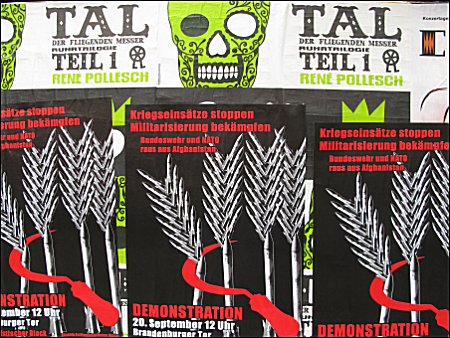
.jpg)
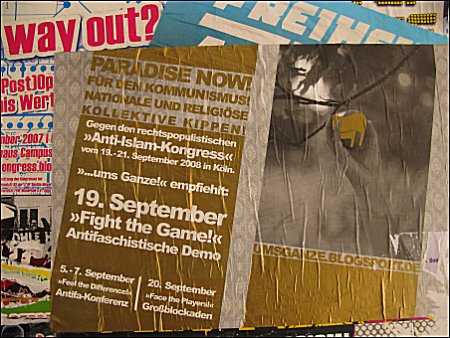
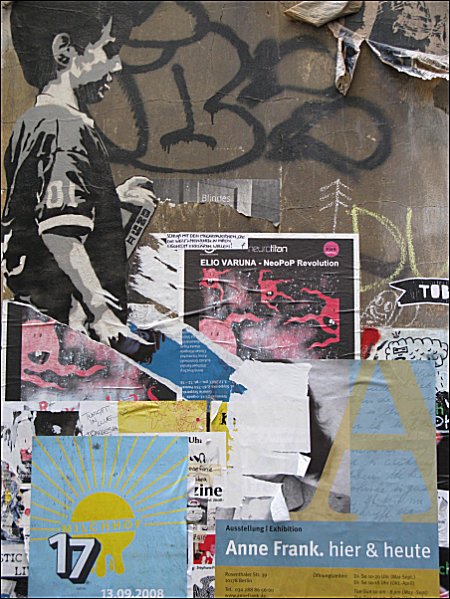
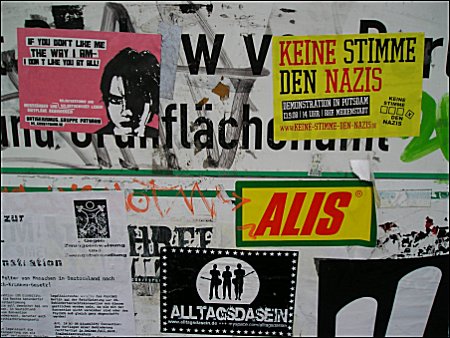
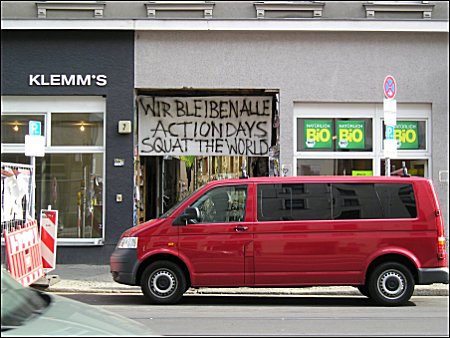
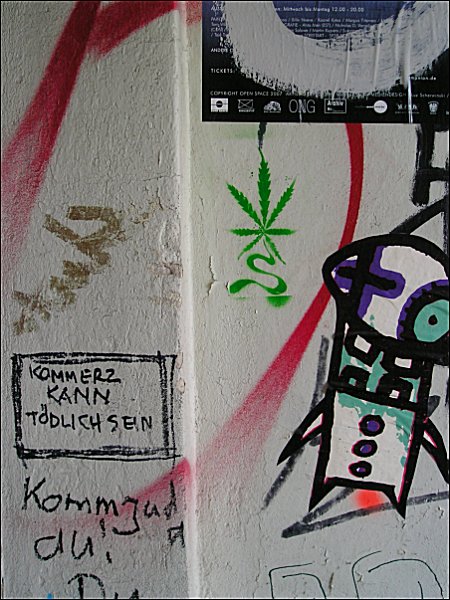
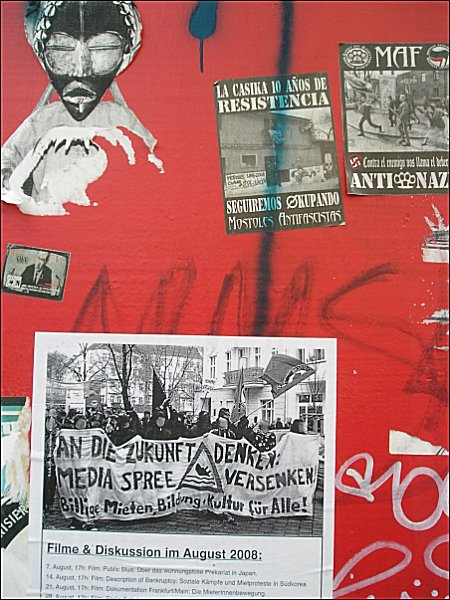
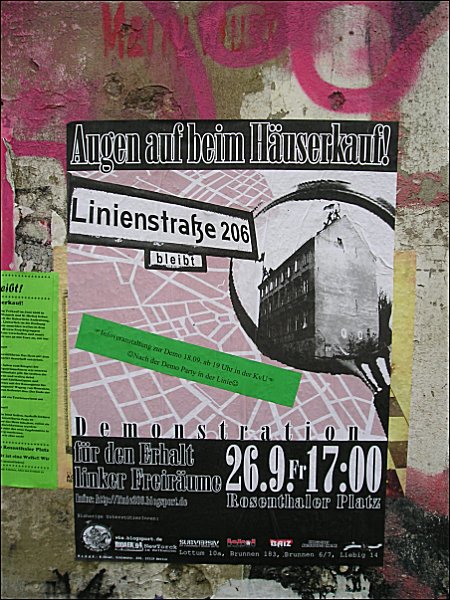
Nachrichten aus Berlin
Unser Korrespondent Anton K. berichtet:
Berliner Plakate IV: Protest
Photos Anton K.
fleursdumal.nl magazine
More in: Anton K. Photos & Observations, FDM in Berlin, MUSEUM OF PUBLIC PROTEST, Nachrichten aus Berlin
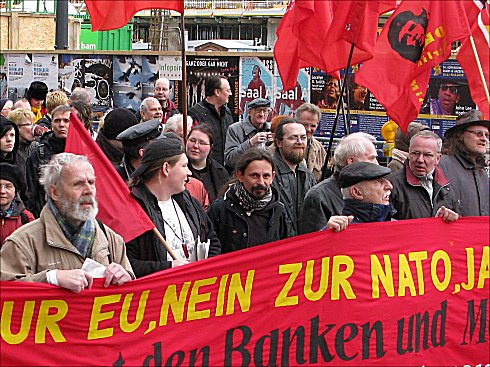
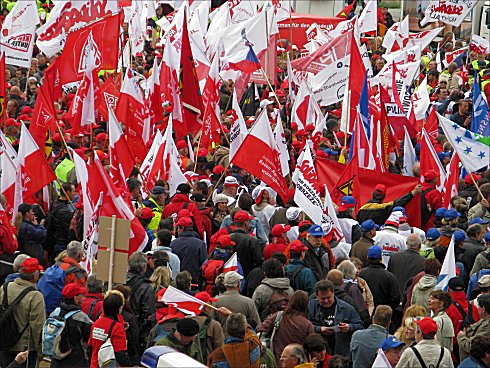
Street poetry: Nein zur Nato
photo Anton K. Berlin -fleursdumal.nl magazine
museum of public protest
More in: MUSEUM OF PUBLIC PROTEST, Street Art
.jpg)
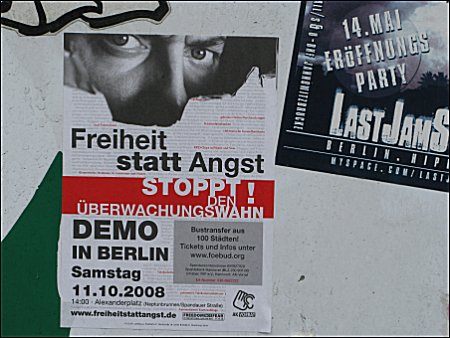

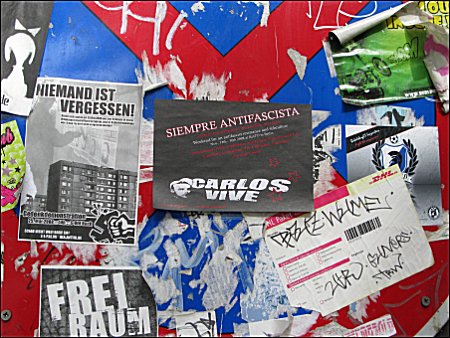
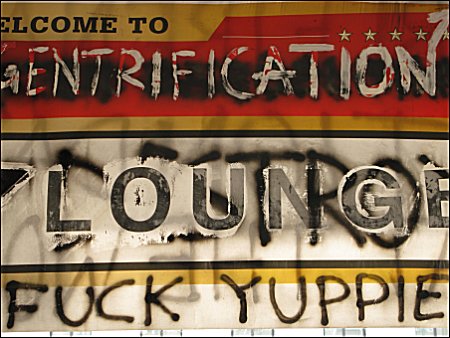
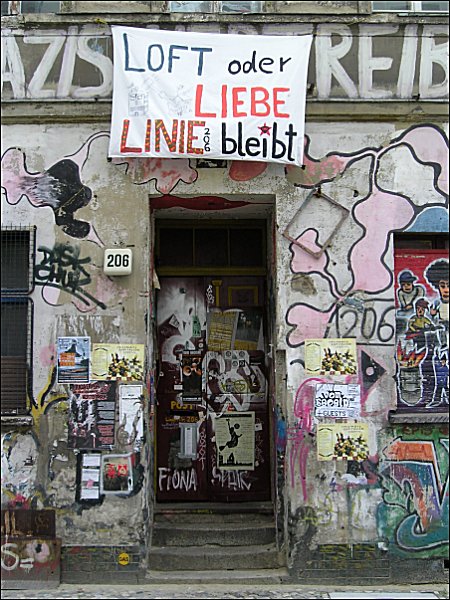
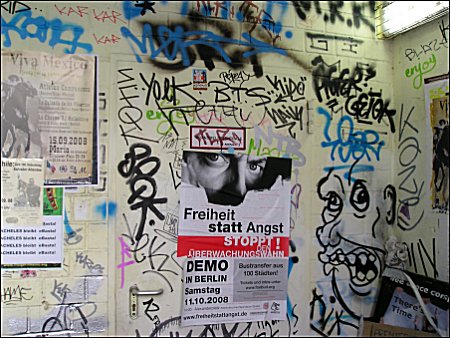
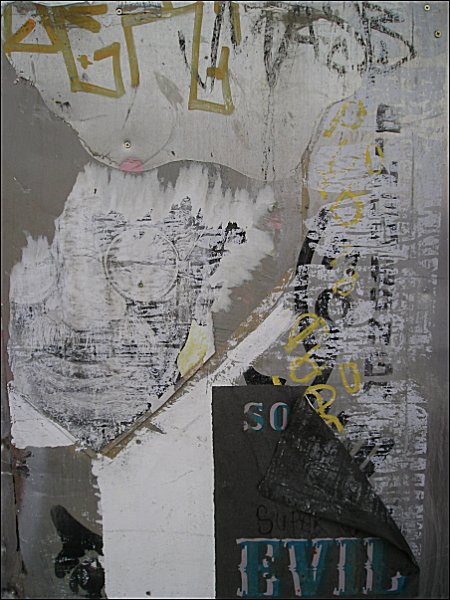

Nachrichten aus Berlin
Unser Korrespondent Anton K. berichtet:
Berliner Plakkaten III
Photos Anton K.
fleursdumal.nl magazine
More in: FDM in Berlin, MUSEUM OF PUBLIC PROTEST, Nachrichten aus Berlin
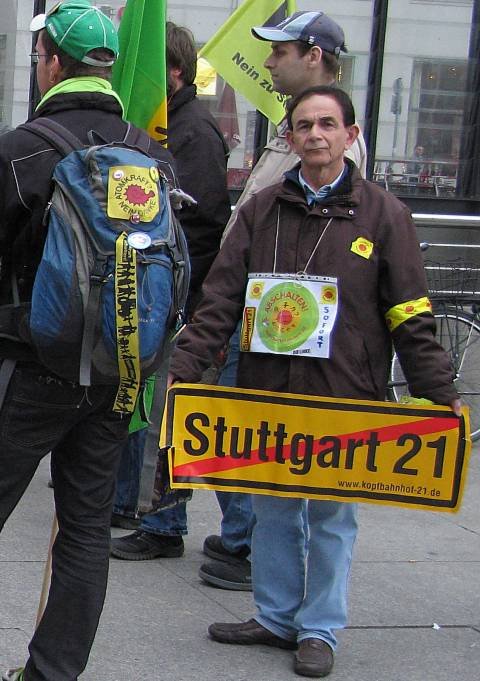
Street poetry: Stuttgart 21
Museum of Public Protest
Photo Anton K. Berlin 2011
fleursdumal.nl magazine
More in: Anton K. Photos & Observations, MUSEUM OF PUBLIC PROTEST, Street Art, Street Poetry
.jpg)
K ä t h e K o l l w i t z
Die Toten Mahnen uns
Berlin
The street names still reflect old DDR times, before the demolishment of the wall in 1989. The Karl-Liebknecht-Straße runs alongside the Alexanderplatz and connects Prenzlauer Berg to the Museuminsel and Unter den Linden. At the Rosa-Luxembourg-Platz, a few hundred meters to the north, a monument to Herbert Baum and a memorial plaque to Ernst Thälmann commemorate the resistance of the communists against fascism and against the wars that overshadowed life in Europe during the first half of the 20th century. The rise of a working class who lived in miserable conditions dominated social discussions in the early 1900’s. In 1914 a complex combination of imperialism, militarism and strong nationalistic feelings led to the First World War which eventually involved 75 percent of the world’s population and took the lives of 20 million soldiers and civilians. After the war the political situation in Germany remained unstable. The Treaty of Versailles declared Germany responsible for the war, it redefined its territory and Germany was forced to pay enormous war reparations. This treaty caused great bitterness in Germany and was a source of inspiration for both left and right extremism. It eventually led to the rise of fascism and the Second World War. Karl Liebknecht and Rosa Luxembourg, founders of the Kommunistische Partei Deutschland (KPD), were killed in 1919 by Freikorpsen, right extremist remainders of the German army. Herbert Baum and his resistance group were killed by the Gestapo in 1942 and Ernst Thälmann, Hitlers political opponent during the elections of 1932, was executed in Buchenwald in August 1944, on direct orders from Hitler.
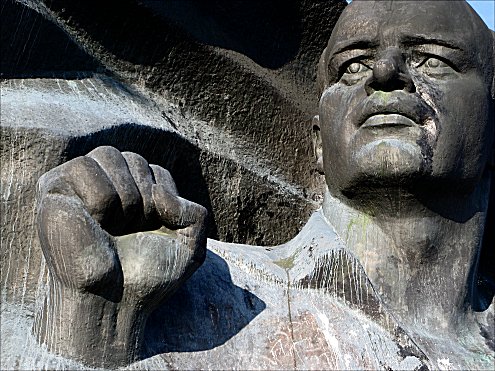
Käthe Kollwitz
Käthe Schmidt was born in Königsberg in 1867 in a family of social democrats that were sensitive to the changes that were taking place in society. Her talent for art was recognised and stimulated by her father. She received lessons in drawing in a private art school in Berlin. Under the influence of her teacher Stauffer-Bern and the work of Max Klinger she decided to focus on black and white drawing, etching and lithography. She married Karl Kollwitz, a friend of the family, in 1891. Karl had decided to dedicate his live to the poor working class and started a doctor’s practice in Prenzlauer Berg in a street that is now called the Käthe-Kollwitz-Straße. They had 2 sons, Hans and Peter. Käthe was deeply moved by the social misery she was confronted with in her husbands practice and the life of the working class became a dominant theme in her work. It was Gerhard Hauptman’s play ‘die Weber’ that inspired her to her first successful series of etchings called ‘Ein Weberaufstand’. Another successful series was ‘Bauernkrieg” for which she received the prestigious ‘Villa Romana’ price. At the age of 50 Käthe had become famous throughout Germany and to the occasion of her birthday, exhibitions of her work were held in Berlin, Bremen and Königsberg.
In October 1914 her son Peter was killed in the trenches of Flanders. To his memory Käthe designed a monument which took her almost 18 years to complete. In Diksmuide-Vladslo, in a landscape covered by hundreds of war cemeteries, her ‘Grieving Parents’ impressively expresses the poignant grief and helplessness of parents who have lost a child. The death of her son had a great impact on her work and war and death became the dominant themes. When Karl Liebknecht was killed in 1919 his family asked Käthe to make a drawing to his memory. In a charcoal drawing she depicts the worker’s farewell to Liebknecht. A final version in woodcut was made 2 years later. Sieben Holzschitte zur Krieg were made in 1920/1923 and her famous poster Nie Wieder Krieg, a consignment by the International Labours Union, in 1924. She was not the only artist that stood up against war but while the artistic protests of for instance George Grosz, Otto Dix or Frans Masereel were primarily aimed at the horrors of the battlefield or the political climate, Käthe Kollwitz’s concern was with the human suffering of those who were left behind.
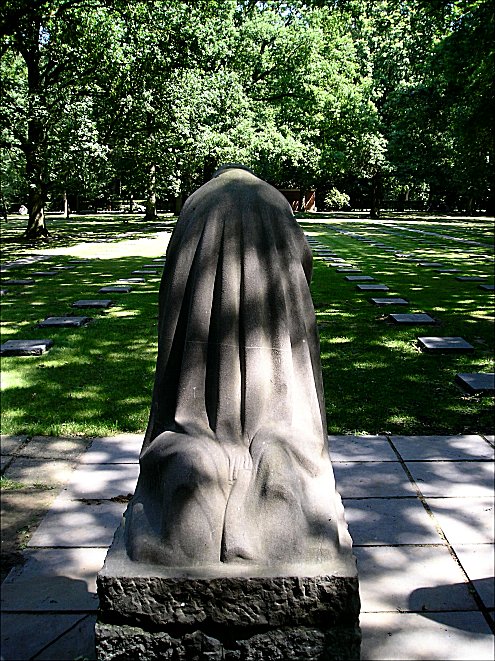
When the Nazis came to power in 1933, she and her husband signed an urgent appeal to unite the working class and to the formation of a front against Hitler. The SPD and KPD were forbidden by the Nazis and Käthe was removed from her position at the Berlin Art Academy where she was heading the Masterclass of Graphics. Exhibitions of her work were forbidden. Karl was also temporarily disallowed to exercise his practice and their financial situation became precarious until his ban was relieved due to a shortage of skilled physicians. Karl Kollwitz, after a life dedicated to the health of the poor, died in July 1940.
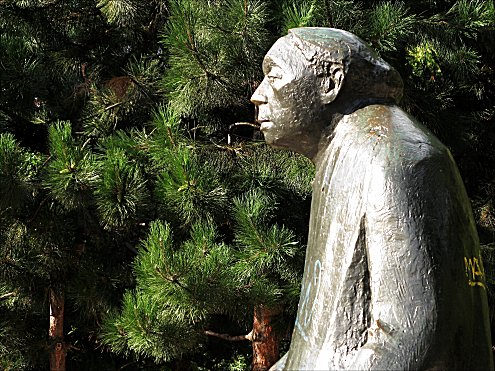
After Karl’s death Käthe suffered from depression and her physical condition was rapidly declining. The house in Berlin where she and Karl had been living since 1891 was bombed in 1943 and Käthe was evacuated to Nordhausen and later to Moritzburg. A few days before the end of the Second World War, in April 1945, Käthe Kollwitz died. She was buried in the family grave in Berlin-Friedrichsfelde at the same cemetery where a memorial monument pays tribute to the socialist heroes Karl Liebknecht, Rosa Luxembourg and Ernst Thälmann.
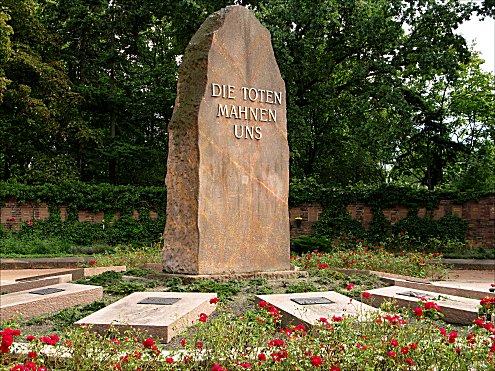
A mission
Käthe’s importance as an artist cannot be overvalued. Her authentic, expressive depictions of human misery, resulting from the exploitation of human labour, from fascism and war, are timeless, genuine and moving. She was not a politician but an artist with a vocation who found a way to make art that goes straight to the heart.
When you are in Berlin be sure to visit ‘Die Neue Wache’, a building designed by Christian Schinkel, which since the 1960-s is a monument against war and fascism. In the centre of the building, right beneath a circular opening in the ceiling, Käthe Kollwitz’s sculpture Mother and Child is an arresting plea for vigilance against mentalities and attitudes that may again lead to fascism and war.
References:
Ilse Kleberger: Kathe Kollwitz, Eine Biographie
Venues
Neue Wache – Unter den Linden near the Museuminsel
Kathe Kollwitzmuseum Berlin – Fasanenstrasse 24
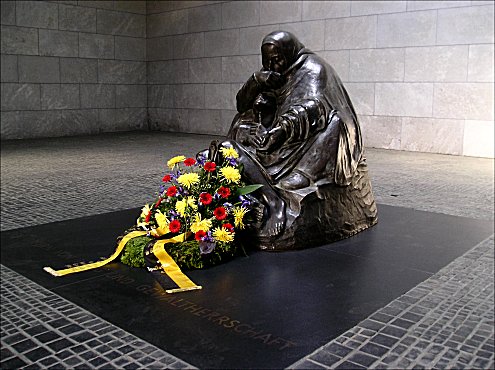
Käthe Kollwitz: Die Toten mahnen uns – part I
Photos & text: Anton K. Berlin
![]()
Find also on fleursdumal.nl magazine:
Nie Wieder: Wache gegen Faschismus
and
Historia Belgica: Alles voor Vlaanderen
![]()
fleursdumal.nl magazine – magazine for art & literature
to be continued
More in: *War Poetry Archive, Anton K. Photos & Observations, Fascism, Käthe Kollwitz, Sculpture

foto joost bataille
Esther Porcelijn
Bloemlezen en Koffiedik kijken
op de Roze Maandag
Lights On
Daar gaan we Weer Weer WEER Weer.
Zonder ideeën ben ik er niet
Zonder ideeën zijn jullie er niet
Zonder de mensen is er niks
om over te praten.
Zonder verschillen kunnen we alles
stilzwijgend ondergaan.
Dan gaan de lichten op de dimstand.
De grootste beren op de Roze rots,
Komrij’s Paralymics.
Het anders-zijn wordt juist benadrukt?
Met z’n allen in een draaimolen,
de carrousel.
Alle plaatjes van mensen in de centrifuge
tot oliebolsap.
Allemaal hetzelfde,
behalve op Roze maandag.
Nog een Keer Keer KEER Keer.
Online bashen, inmaken oprotten optiefen onder de lakens houden, achter de voordeur. “Mij maakt het niet uit hoor,” als ze maar niet ehm zoenen op straat, ehm handen vasthouden, ehm genegenheid tonen, ehm mij aankijken, ehm iets roze-achtigs doen, ehm of denken, ehm ademen, of ehm leven.
“Het is een ziekte,”
“homo’s zijn dierlijk.”
Nieuw Nieuw NIEUW Nieuw
Oproer uit de jaren 50.
Conservatisme is de allergrootste traditie.
Misplaatste frustratie
van anoniem-schreeuwers is
de online munitie
waar we met z’n allen in draaien.
Zij met de grootste aannames nemen
nooit iets aan van anderen,
want dat is een no-Go Go GO Go.
Dansers in kooien, harde sex, slappe handjes,
roze boa’s, darkrooms.
Cliché Cliché CLICHÉ Cliché.
Niet te verdragen.
Erger nog dan Jonge Sla.
Gay. What’s in a name?
Mo money mo homo mo homo mo homo
Geld waard.
Straks mis je nog de Bootsma.
Geld waard, twee voor de prijs van
Één Één ÉÉN Één.
Benadruk het anders zijn,
anders doet niemand het,
gaan de lichten op dimstand.
Zwieren en draaien.
Daar gaan We We WE We
Weer Weer WEER Weer.
Het evenement ‘Roze Maandag’ maakt onderdeel uit van de Tilburgse Kermis, juli 2012. Het gedicht ‘Bloemlezen en Koffiedik kijken op de Roze Maandag’ werd eerder gepubliceerd in het Brabants Dagblad.
esther porcelijn poetry
kempis.nl poetry magazine
More in: Archive O-P, Archive O-P, LGBT+ (lhbt+), Porcelijn, Esther

Teken petitie Amnesty International:
Rusland laat Pussy Riot vrij!
Drie leden van de Russische punkband Pussy Riot zijn veroordeeld tot twee jaar strafkamp voor het anti-Poetinlied dat zij zongen in een Moskouse kathedraal. De rechter vond hen schuldig aan ‘door religieuze haat gevoed hooliganisme’. Terwijl ze niets anders deden dan gebruikmaken van hun recht op vrije meningsuiting.
Vraag de Russische autoriteiten om de onmiddellijke vrijlating van de Pussy Riot-meiden. Onderteken deze petitie.
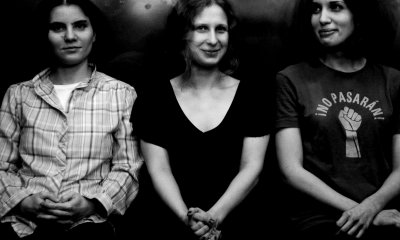
I am deeply concerned about the two-years prison sentences handed down to Maria Alekhina, Ekaterina Samutsevich and Nadezhda Tolokonnikova for performing a protest song in a cathedral as part of a feminist punk group “Pussy Riot”. The three young women have been found guilty of hooliganism under Article 213 of the Russian Criminal Code, for performing a protest song in Moscow’s Christ the Saviour Cathedral on February 21, 2012.
Amnesty International has declared these women to be prisoners of conscience, for they are detained solely for the peaceful expression of their beliefs. Therefore I respectfully urge you to immediately and unconditionally release Maria Alekhina, Ekaterina Samutsevich and Nadezhda Tolokonnikova
Furthermore, I call on you to immediately and impartially investigate threats received by the family members and lawyers of the three women and, if necessary, ensure their protection. Whether or not the women were involved in the performance in the cathedral, freedom of expression is a human right under Article 19 of the Universal Declaration of Human Rights, and no one should be jailed for the peaceful exercise of this right.
• SIGN PETITION AMNESTY INTERNATIONAL
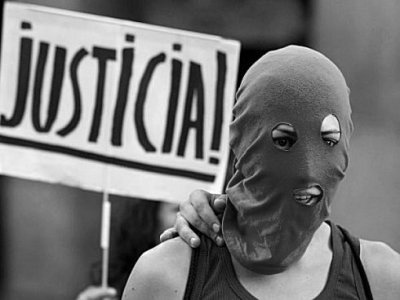
fleursdumal.nl magazine
More in: MUSEUM OF PUBLIC PROTEST, REPRESSION OF WRITERS, JOURNALISTS & ARTISTS
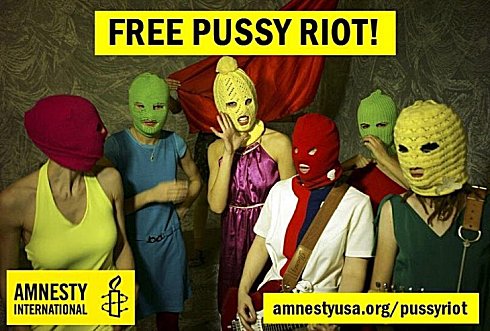
Russian court finds Pussy Riot guilty
A Russian court’s decision today to find members of the punk rock protest band Pussy Riot guilty of “hooliganism” is a bitter blow for freedom of expression in the country, Amnesty International said today.
Amnesty International said it believed that the trial of the Pussy Riot defendants – Maria Alekhina, Ekaterina Samutsevich and Nadezhda Tolokonnikova – was politically motivated, and that they were wrongfully prosecuted for what was a legitimate – if potentially offensive – protest action.
The organization considers all three activists to be prisoners of conscience, detained solely for the peaceful expression of their beliefs.
“The Russian authorities should release the members of Pussy Riot immediately and unconditionally,” said John Dalhuisen, Director of Amnesty International’s Europe and Central Asia Programme.
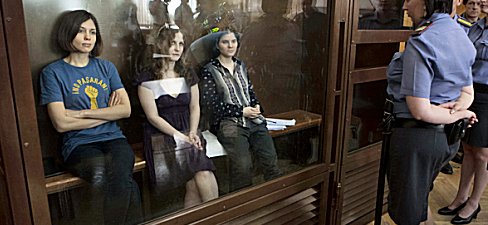
“A number of measures restricting the freedom of expression and association have been introduced in response to the wave of protest that accompanied the recent parliamentary and presidential elections. This trial is another example of the Kremlin’s attempts to discourage and delegitimize dissent. It is likely to backfire.”
Pussy Riot performed the protest song “Virgin Mary, redeem us from Putin” in Christ the Saviour Cathedral in Moscow on 21 February, with the group members covering their faces in balaclavas.
The song called on the Virgin Mary to become a feminist and banish Vladimir Putin. It also criticized the dedication and support shown to Putin by some Russian Orthodox Church representatives. It was one of a number of performances intended as a protest against Vladimir Putin in the run-up to Russia’s presidential elections in March.
The Russian authorities subsequently arrested Maria Alekhina and Nadezhda Tolokonnikova on 4 March, and Ekaterina Samutsevich on 15 March, claiming they were the masked singers.
The Pussy Riot trial started on 30 July in Moscow’s Khamovnicheskii District Court and was over in eight days. The judge dismissed most of the defence team’s requests to call up witnesses. There were concerns that fair trial standards might have been violated.
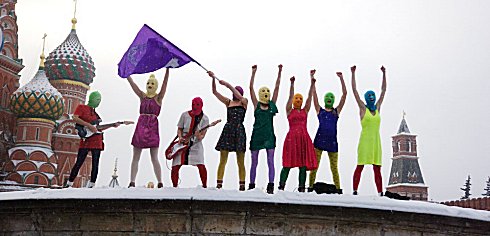
Russian court jails Pussy Riot for two years
A Russian court’s decision today to find guilty members of the punk rock protest band Pussy Riot is a bitter blow for freedom of expression in the country, Amnesty International said today.
Three members of the all-female group were charged with “hooliganism on grounds of religious hatred” after they sang a protest song in Moscow’s main Orthodox cathedral in February.
The judge sentenced them to two years imprisonment in a penal colony. The lawyers for the three said they were planning to appeal the decision.
Amnesty International said it believed that the trial of the Pussy Riot defendants – Maria Alekhina, Ekaterina Samutsevich and Nadezhda Tolokonnikova – was politically motivated, and that they were wrongfully prosecuted for what was a legitimate – if potentially offensive – protest action.
The organization considers all three activists to be prisoners of conscience, detained solely for the peaceful expression of their beliefs.
“The Russian authorities should overturn the court ruling and release the members of Pussy Riot immediately and unconditionally,” said John Dalhuisen, Director of Amnesty International’s Europe and Central Asia Programme.
“What Maria Alekhina, Nadezhda Tolokonnikova and Ekaterina Samutsevich did was calculated to shock – and did shock many. But in sentencing them to two years’ imprisonment, Russia has set the limits of freedom of expression in the wrong place.”
“A number of measures restricting the freedom of expression and association have been introduced in response to the wave of protest that accompanied the recent parliamentary and presidential elections. This trial is another example of the Kremlin’s attempts to discourage and delegitimize dissent. It is likely to backfire.”
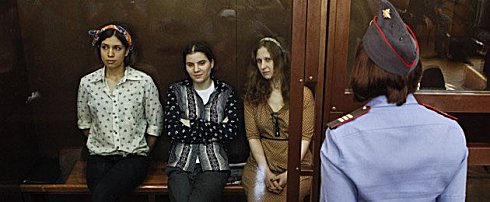
Background
Pussy Riot performed the protest song “Virgin Mary, redeem us from Putin” in Christ the Saviour Cathedral in Moscow on 21 February, with the group members covering their faces in balaclavas.
The song called on the Virgin Mary to become a feminist and banish Vladimir Putin. It also criticised the dedication and support shown to Putin by some Russian Orthodox Church representatives. It was one of a number of performances intended as a protest against Vladimir Putin in the run-up to Russia’s presidential elections in March.
The Russian authorities subsequently arrested Maria Alekhina and Nadezhda Tolokonnikova on 4 March, and Ekaterina Samutsevich on 15 March, claiming they were the masked singers.
The Pussy Riot trial started on 30 July in Moscow’s Khamovnicheskii District Court and was over in eight days. The judge dismissed most of the defence team’s requests to call up witnesses. There were concerns that fair trial standards might have been violated.
The case generated a wide debate on blogs, social networks and in the media about freedom of expression, the place of the Church in a modern secular state and the independence of courts.
In June, more than 200 Russian cultural figures, well-known writers, musicians and actors, among others, signed an open letter in support of Maria Alekhina, Nadezhda Tolokonnikova and Ekaterina Samutsevich. It was then posted on the Echo Moskvy radio web site and collected around 45,000 further signatures.
Also in June, a group of Orthodox believers sent an open letter to Patriarch Kirill, the leader of the Russian Orthodox Church, asking for mercy for the three arrested women.
In August, a group of lawyers published an open letter in which they stated that the actions of the three women could not be qualified as a crime and that bringing charges against them was in violation of the Russian law.
The Pussy Riot case received a broad coverage abroad and generated the support of many international artists, including Sting, Madonna, Yoko Ono and Bjork.
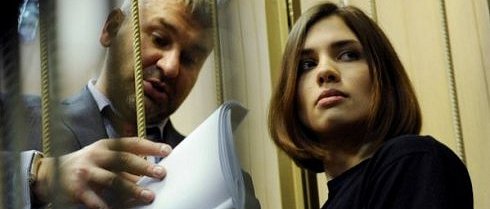
Source: Website Amnesty International
fleursdumal.nl magazine
More in: # Music Archive, Art & Literature News, MUSEUM OF PUBLIC PROTEST, PRESS & PUBLISHING, REPRESSION OF WRITERS, JOURNALISTS & ARTISTS, STREET POETRY
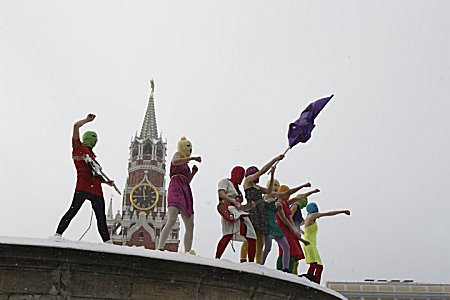
Russia urged to release ‘Pussy Riot’ group as court prolongs detention
A court in Moscow has ruled that three members of the female punk group Pussy Riot must remain in custody for six months after singing a protest song in Moscow’s main Orthodox church, prompting Amnesty International to reiterate its call for their immediate release.
Maria Alekhina, Ekaterina Samutsevich and Nadezhda Tolokonnikova, who are accused of “hooliganism on the grounds of religious hatred”, face possible prison sentences of up to seven years.
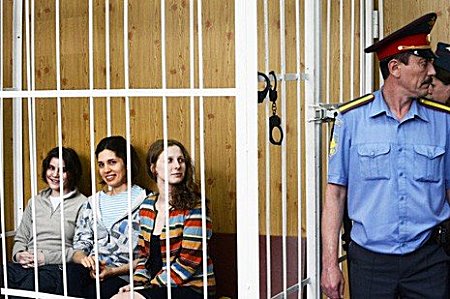
“These three activists have now been behind bars for months,awaiting a trial that should not be taking place, ” said Amnesty International Europe and Central Asia Programme Director John Dalhuisen.
“Even if the three arrested women did take part in the protest, the severity of the response of the Russian authorities and the detention on the serious criminal charge of hooliganism would not be a justifiable response to the peaceful – if, to many, offensive – expression of their political beliefs.”
The preliminary hearing of the case will continue next week, on 23 July.
Amnesty International considers the activists to be prisoners of conscience, detained solely for the peaceful expression of their beliefs.

“The Russian authorities must drop the charges of hooliganism and immediately and unconditionally release these three women, ” said Dalhuisen.
The protest song Virgin Mary, redeem us of Putin was performed in Christ the Saviour Cathedral in Moscow on 21 February 2012 by several members of the feminist Pussy Riot group with their faces covered in balaclavas.
The song calls on Virgin Mary to become a feminist and banish Vladimir Putin. It also criticises the dedication and support shown to Putin by some representatives of the Russian Orthodox Church.
It was one of a number of performances intended as a protest against Vladimir Putin in the run-up to Russia’s presidential elections in March.
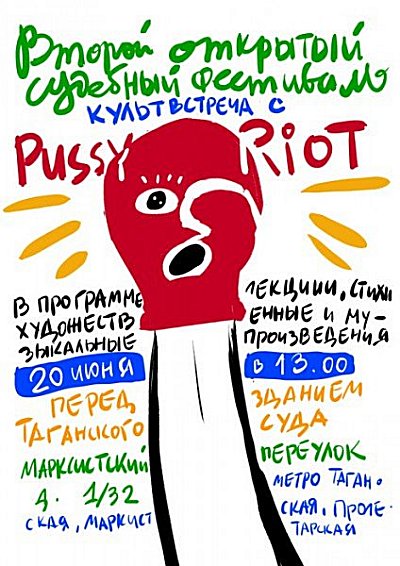
The Russian authorities subsequently arrested Maria Alekhina and Nadezhda Tolokonnikova on 4 March and Ekaterina Samusevich on 15 March, claiming they were the masked singers.
One of the women, Nadezhda Tolokonnikova, admitted to being a member of the larger ‘Pussy Riot’ group and taking part in the protest while the other two deny any involvement in the cathedral protest.
Since its establishment in 2011, the Pussy Riot group has conducted several performances in public places such as the Moscow underground, Red Square and on the roofs of buses.
In media interviews the group members have stated that they protest against, among other things, stifling of freedom of expression and assembly in Russia, the unfair political process and the fabrication of criminal cases against opposition activists.
The European Court of Human Rights has repeatedly held that freedom of expression applies not only to inoffensive ideas, “but also to those that offend, shock or disturb the State or any sector of the population”.
“Even if the action was calculated to shock and was known to be likely to cause offence, the activists left the Cathedral when requested to do so and caused no damage,” said Dalhuisen.
“The entire action lasted only a few minutes and caused only minimal disruption to those using the Cathedral for other, notably religious, purposes.”
“The broader political context surrounding the anti-Putin protests at the time – and the anticlerical, anti-Putin content of the activists’ message (themselves unpunishable) – have clearly and unlawfully been taken into account in the charges that have been brought against them.”

A video montage of the song available on the internet has led to a wide debate about the protest. The press secretary of President-elect Vladimir Putin called the protest despicable and said it would be followed up “with all the necessary consequences”.
Although a representative of the Orthodox Church initially called for mercy for the protestors, subsequent statements by representatives of the Church have called for harsh punishment and for the women to be prosecuted for inciting hatred on grounds of religion. The women’s relatives have reportedly also received anonymous death threats.
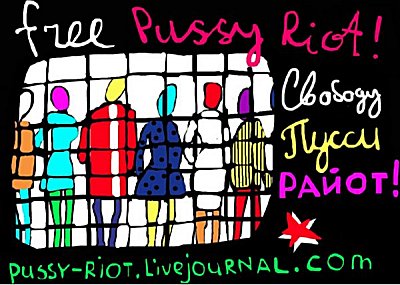
≡ Website Amnesty International
fleursdumal.nl magazine
More in: MUSEUM OF PUBLIC PROTEST, REPRESSION OF WRITERS, JOURNALISTS & ARTISTS
Amputeer acrobaten.
Henk & Ingrid
http://www.henkeningrid.org/
More in: MUSEUM OF PUBLIC PROTEST, The talk of the town
Thank you for reading Fleurs du Mal - magazine for art & literature